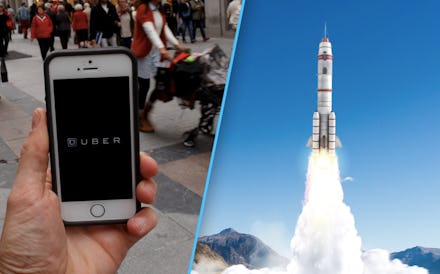Uber is developing flying cars — but its biggest problems are on the ground

Silicon Valley loves to shoot for the moon before fixing the problems back home.
Case in point: Amid ongoing disputes over customer harassment and employee mistreatment, the company finally announced it was hiring someone to oversee its assault incidents. Just kidding... it hired someone to help build flying cars.
Mark Moore, a NASA aircraft engineer, will join Uber as the director of engineering for aviation on a project called Uber Elevate. It's an initiative to allow users to commute in the air using "VTOL" aircraft, meaning vertical take-off and landing.
It's not unusual for Silicon Valley to quite literally reach for the stars. Google's Larry Page has invested in not one but two flying car startups. Facebook wants to use a massive drone to beam internet down to remote regions around the world. Elon Musk wants to colonize Mars. Tech companies are fixated on the future.
There's nothing wrong with Uber's mission to revolutionize transportation or its vision of a Jetsons-inspired future. There's nothing wrong with pouring resources into a high-risk project. Innovation has to start somewhere.
But where is that sense of audacious spirit when it comes to dealing with the company's mounting sexual assault incidents? Or poor working conditions? Or abysmal wages? Or its own drivers being murdered?
Uber's biggest challenges are on the ground
Right now, Uber faces a global backlash for paying some drivers less than minimum wage. Drivers around the world are demanding more ethical business practices that result in fair wages and working conditions.
Thousands of drivers from Uber and ride-sharing app Ola are protesting in New Delhi for "reduced working hours, better monetary incentives, higher base fare and accident insurance," BuzzFeed reported. Protesters in San Francisco this month took Uber to task for invading user privacy, pushing out tenants and paying some of its drivers unlivable wages.
As for the passengers, people are demanding the assurance they will get from point A to point B without the risk of harassment or rape. As recently as January, an Uber driver in San Antonio was accused of raping a young woman after he drove her home in October, and a college freshman filed a lawsuit against the company, claiming her driver sexually assaulted her after ordering an Uber in East Lansing, Michigan.
Lawmakers have fought for more widespread regulations on ride-sharing companies including Uber and Lyft, pushing for deeper background checks on drivers to ensure better safety for passengers. But the companies have argued against fingerprinting, a standard many cities have been pushing for.
Uber and Lyft's opposition to fingerprinting — that it is "unfair, onerous, racially tilted and unreliable," according to the Washington Post — has raised skepticism. The belief is that this opposition comes from a less noble place: that Uber and Lyft drivers could then make a stronger case that they are employees and not private contractors, affording them more benefits than a private contractor legally requires.
Beyond pushing back on stricter background checks for drivers, Uber has remained mostly mum on the issue of its drivers attacking its passengers. When Mic reached out to Uber in December to ask if it supported efforts toward creating a public database of sexual harassment and assault reports, in regards to a proposed New York City bill, Uber said it can't comment on legislation it hasn't seen. When followed up with a link to the article about the bill, Uber declined to make a comment on the record.
When Mic asked Uber if it had a team or position in place that deals specifically with sexual harassment and assault, an Uber spokesperson provided the following statement:
"We have a trust and safety team that covers all safety issues (including those you mention) and developing technologies that can predict, prevent and reduce safety risks. Safety is deeply important to us and we are constantly leveraging technology to focus on safety before, during and after every ride."
To reassure its vulnerable passengers, it would be nice to see Uber approach its sexual assault problem with as much pluck if not more that it allots to its moonshot ideas. If a woman is already hesitant to get in the car with a driver who hasn't undergone a rigorous background check, imagine how she'll feel getting in that car and then soaring a mile high.